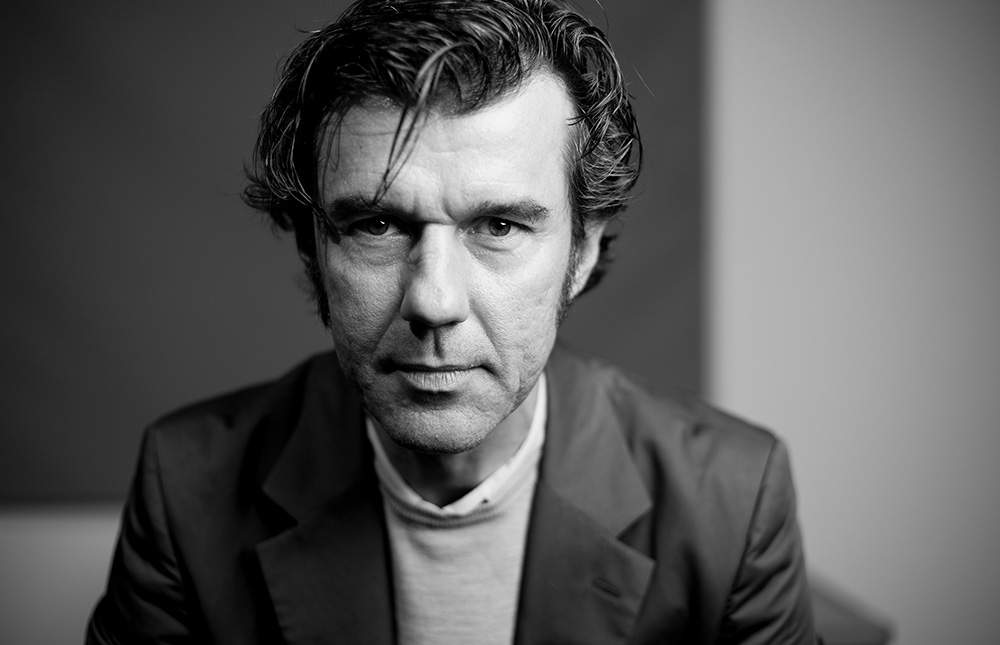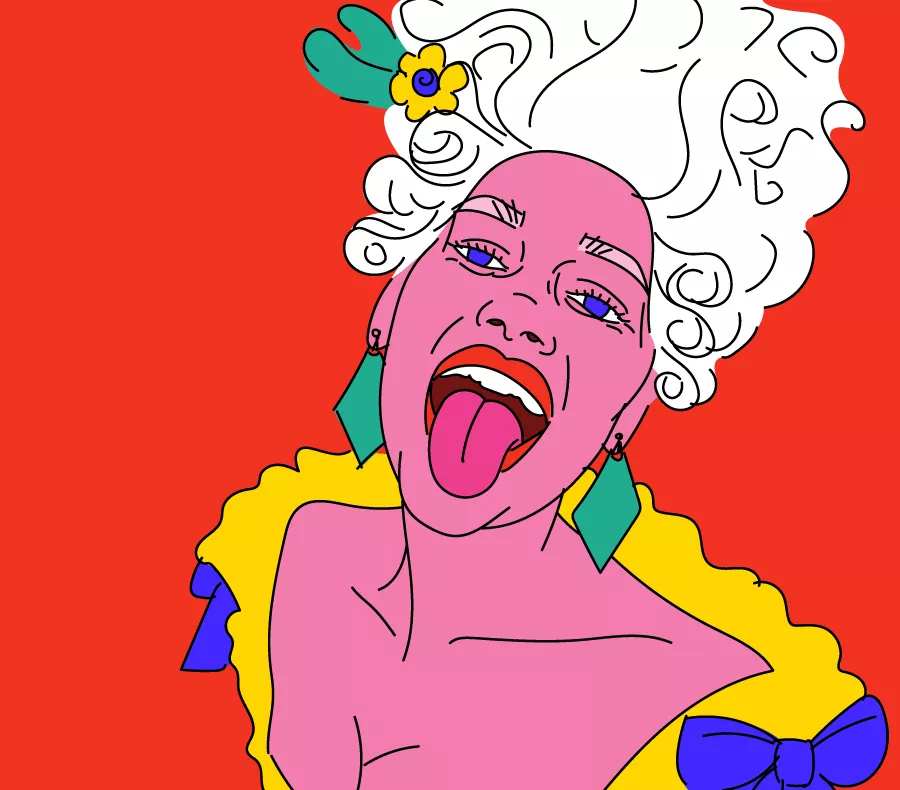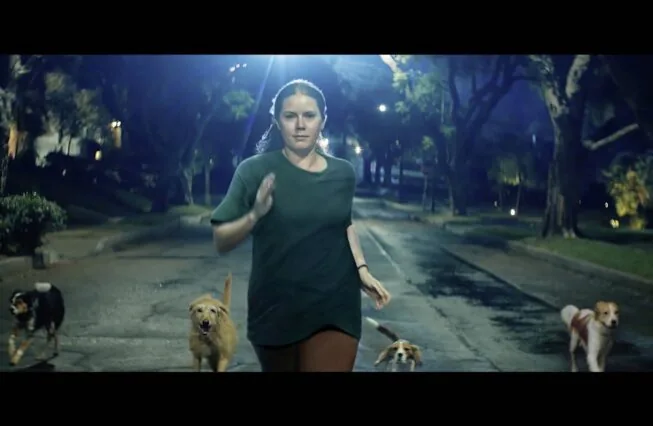The exhibition is a collection of Sagmeister’s discovery when he set out to answer the question “What makes people happy?” The results are not ground-breaking, but how the The Happy Show presents them, is.
What the Austrian-born, and his New-York based design agency, Sagmeister & Walsh, have done is present truths that could be found in any self-help book up on walls, but with the use of their bold creative design, they’ve done it in a beautiful and powerful way. This is inspiring people to pay attention to the concept of ‘happiness’ in a way they haven’t since people began claiming they have “no time” to read philosophy books.
As the exhibition enters its last month at the MAK, Vienna Würstelstand talks with Stefan Sagmeister about happiness, love, why we prefer reading bad news in the newspapers to good, and how it’s all about following the carrot.
Vienna Würstelstand (VW): Conversation we heard on the street from people who had just exited the exhibition:
– “Phew, I need a cigarette,” says mid-30ies, moderately handsome man.
– “Hey, is that what you learned from the exhibition?” girl with cute, slightly dirty, cheeky smile, says with a laugh.
– “No, I learnt that we shouldn’t have kids, and that I shouldn’t spend so much time in the morning in front of the mirror,” he says lighting his cigarette. She laughs.
– “These two lessons kind of go together, no?”
If you were to interrupt this conversation at this point, what would you say?
Stefan Sagmeister (S): Just like myself, everybody remembers the parts that speak to them. We cherry-pick what we remember.
VW: I know you’ll want to pull out an eyelash of mine for asking this question: After your exploration of the emotion, could you define happiness… pretty please.
S: Yes, your eye-lashes are pulled. The best happiness definition I came across is one that divides happiness according to length of time. There is short term happiness, like a happy moment, bliss, or joy; there is a medium time happiness, like satisfaction and well-being (lying on the couch on a Sunday, reading the newspaper), and there is long term happiness, like finding the thing that you are good at in life.
VW: It seems like a lot of effort to remain and keep a constant state of happiness. Is it worth it? Doesn’t unhappiness have its qualities too?
S: I think it is impossible to stay in a constant state of happiness. Evolution designed happiness as a carrot to tell us the right way. If this compass would constantly point to the North, it’s not worth anything. Phases of unhappiness are necessary for me to learn.
VW: I went from your exhibition being in a state of elated happiness to a bar where I read the newspaper, which I do most days, and I realised that reading the going-ons in the world (mostly related to terror, disease, Donald Trump, Europe’s refugee “crisis” and some story about how worms can help you lose weight) made me unhappy. Does being happy somewhat require being self-absorbed and ignorant?
S: No. I think we all enjoy reading negative news more than positive news, because of our negative bias. We are more alert to bad things happening, than good things. This represents likely a tradition brought to us by our pre-historic ancestors for whom it was a necessity of survival to take the approaching tiger more seriously (they would die), than the banana (there might be another one). Which is why all attempts to create a positive newspaper died after a week or two: Nobody was interested.
VW: Did the compiling of this exhibition/show change your life and the way you perceive your life?
S: Yes it did, but not by as much as I would have thought it would. Maybe by 10%.
VW: Who is the happiest person you know? What have you learnt from them? Describe them.
S: My friend Robert. He is self-confident (which also means he is not neurotic), and is blessed with a sunny disposition. Many psychologists think that our happiness levels are about 50% genetic. Robert won the lottery at birth.
VW: If you one day woke up and hated everything about graphic design, what would you do instead?
S: Likely do film. But it would be VERY hard. I’m not sure if I could catch up.
VW: What is the best song you use to cheer yourself up?
S: Das Racist: Combination Pizza Hut and Taco Bell.
VW: Please draw us your happy creature/animal (like you ask people to do as part of the exhibition).
VW: Is the happiness gum ball machine in the exhibition rigged? I tried number 5 (in a nervous attempt to be semi-honest about my current state of moderate happiness) and no gum ball came out.
S: No. That must have been a stuck gum ball in the number five. Even though we bought the best industrial-built-to-be-outside-on-the-street gum ball machines, every once in a while they do get clogged, anyway.
VW: What were some of the random thoughts that went through your head during the meditation you did?
S: How did they have the guts to redo the Joker in Batman after Jack Nicholson gave a rather stellar performance?
VW: How happy does the creative process make you, and what comes first – the creativity or the happiness?
S: I could not answer that one. I know that I have a better chance to come up with an idea when I’m in good shape. But it’s also happened that I’ve been in a so-so shape, and the fact that I did have a proper thought improved my state of well-being.
VW: You said “when you were young, you thought that the only kind of love is the passionate kind” – what made you realise otherwise?
S: Experience and science. Our scientific adviser, Jonathan Haidt, says that it’s impossible to be passionately in love for more than 6 months. The high dopamine levels would be very unhealthy for our bodies long-term.
VW: What would be your biggest tip for anyone attempting to do what you did with handing out compliments and flowers to random people on the street in The Happy Show film?
S: Don’t do it as it likely won’t work. In the meantime, I learned that it would be much more successful to talk to people in a place where they are not moving along, say a store or supermarket, and to ask a good question, rather than giving a compliment.
VW: Drawing on what you’ve learned on your exploration of happiness, what advice would you give to somebody who’s carrying a chewed up, broken heart?
S: I, myself, would jump into work, full power. That, of course, won’t really solve my broken heart problem, but it does make me think of something else, and it makes time pass. And the old adage that the passing of time helps, is really true. This approach also has the fine side effect of being really productive.






